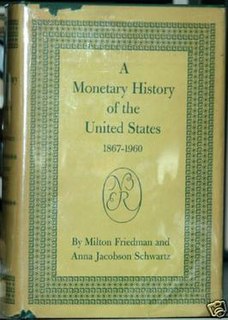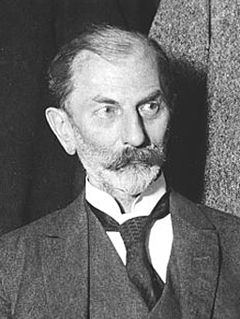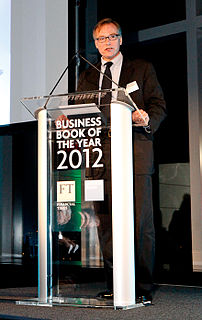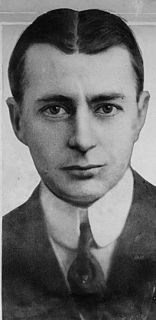
A gold standard is a monetary system in which the standard economic unit of account is based on a fixed quantity of gold. The gold standard was widely used in the 19th and early part of the 20th century. Most nations abandoned the gold standard as the basis of their monetary systems at some point in the 20th century, although many still hold substantial gold reserves.

Montagu Collet Norman, 1st Baron Norman DSO PC was an English banker, best known for his role as the Governor of the Bank of England from 1920 to 1944.

The causes of the Great Depression in the early 20th century in the USA have been extensively discussed by economists and remain a matter of active debate. They are part of the larger debate about economic crises and recessions. The specific economic events that took place during the Great Depression are well established. There was an initial stock market crash that triggered a "panic sell-off" of assets. This was followed by a deflation in asset and commodity prices, dramatic drops in demand and credit, and disruption of trade, ultimately resulting in widespread unemployment and impoverishment. However, economists and historians have not reached a consensus on the causal relationships between various events and government economic policies in causing or ameliorating the Depression.

The Federal Reserve System has faced various criticisms since it was authorized in 1913. Nobel laureate economist Milton Friedman and his fellow monetarist Anna Schwartz criticized the Fed's response to the Wall Street Crash of 1929 arguing that it greatly exacerbated the Great Depression. More recent prominent critics include former Congressman Ron Paul.

Ben Shalom Bernanke is an American economist at the Brookings Institution who served two terms as the 14th Chair of the Federal Reserve, from 2006 to 2014. During his tenure as chair, Bernanke oversaw the Federal Reserve's response to the late-2000s financial crisis, for which he was named the 2009 Time Person of the Year. Before becoming Federal Reserve chair, Bernanke was a tenured professor at Princeton University and chaired the department of economics there from 1996 to September 2002, when he went on public service leave.

The Federal Reserve Bank of New York is one of the 12 Federal Reserve Banks of the United States. It is located at 33 Liberty Street, New York, New York. It is responsible for the Second District of the Federal Reserve System, which encompasses New York State, the 12 northern counties of New Jersey, Fairfield County in Connecticut, Puerto Rico, and the U.S. Virgin Islands. Working within the Federal Reserve System, the Federal Reserve Bank of New York implements monetary policy, supervises and regulates financial institutions and helps maintain the nation's payment systems.

Ronald Chernow is an American writer, journalist, historian, and biographer. He has written bestselling and award-winning biographies of historical figures from the world of business, finance, and American politics.

Anna Jacobson Schwartz was an American economist who worked at the National Bureau of Economic Research in New York City and a writer for The New York Times. Paul Krugman once said that Schwartz is "one of the world's greatest monetary scholars."[1]

Adam Haslett is an American fiction writer and journalist. His debut short story collection, You Are Not a Stranger Here, and his second novel, Imagine Me Gone, were both finalists for both the Pulitzer Prize and the National Book Award. He has been awarded fellowships from the Guggenheim Foundation, the American Academy of Arts and Letters, and the American Academy in Berlin. In 2017, he won the Los Angeles Times Book Prize.

A Monetary History of the United States, 1867–1960 is a book written in 1963 by Nobel Prize–winning economist Milton Friedman and Anna J. Schwartz. It uses historical time series and economic analysis to argue the then-novel proposition that changes in the money supply profoundly influenced the U.S. economy, especially the behavior of economic fluctuations. The implication they draw is that changes in the money supply had unintended adverse effects, and that sound monetary policy is necessary for economic stability. Economic historians see it as one of the most influential economics books of the century. The chapter dealing with the causes of the Great Depression was published as a stand-alone book titled The Great Contraction, 1929–1933.
Debt deflation is a theory that recessions and depressions are due to the overall level of debt rising in real value because of deflation, causing people to default on their consumer loans and mortgages. Bank assets fall because of the defaults and because the value of their collateral falls, leading to a surge in bank insolvencies, a reduction in lending and by extension, a reduction in spending.

Rudolf E. A. Havenstein was a German lawyer and president of the Reichsbank during the hyperinflation of 1921–1923.

The Great Depression was a severe worldwide economic depression that took place mostly during the 1930s, beginning in the United States. The timing of the Great Depression varied across the world; in most countries, it started in 1929 and lasted until the late 1930s. It was the longest, deepest, and most widespread depression of the 20th century. The Great Depression is commonly used as an example of how intensely the global economy can decline.
Liaquat Ahamed is an American author.
The 2010 Pulitzer Prizes were awarded on Monday, April 12, 2010. In journalism, The Washington Post won four awards while The New York Times won three. For the first time, an online source, ProPublica, won in what had previously been the sole province of print. A musical, Next to Normal, won the Drama award for the first time in 14 years. Country singer-songwriter Hank Williams, who died at age 29 in 1953, received a special citation. Below, the winner(s) in each category are listed.

Émile Moreau was Governor of the Banque de France from 1926 to 1930 and chairman of Paribas from 1931 to 1940. After retiring from his role as governor he took a job in a private bank. His contribution to the Poincare Stabilization helped the French Franc to gain credibility in the 1920s following the Russian Default post the Bolshevik Revolution. As pointed out in his memoirs, Emile Moreau took active measures to increase French influence in Eastern Europe. It was under his governorship that French Money Doctors were sent to Romania as advisors.

Financial Times and McKinsey Business Book of the Year Award is an annual award given to the best business book of the year as determined by the Financial Times and McKinsey & Company. It aims to find the book that has 'the most compelling and enjoyable insight into modern business issues'. The award was established in 2005 and is worth £30,000. Beginning in 2010, five short-listed authors each receive £10,000, previously it was £5,000.

Benjamin Strong Jr. was an American banker. He served as Governor of the Federal Reserve Bank of New York for 14 years until his death. He exerted great influence over the policy and actions of the entire Federal Reserve System and indeed over the financial policies of all of the United States and Europe.
Sebastian Christopher Peter Mallaby is an English journalist and author, Paul A. Volcker senior fellow for international economics at the Council on Foreign Relations (CFR), and contributing columnist at The Washington Post. Formerly, he was a contributing editor for the Financial Times and a columnist and editorial board member at The Washington Post.

David Meyer Wessel is an American journalist and writer. He has shared two Pulitzer Prizes for journalism. He is director of the Hutchins Center on Fiscal & Monetary Policy at the Brookings Institution and a contributing correspondent to The Wall Street Journal, where he worked for 30 years. Wessel appears frequently on National Public Radio's Morning Edition.
















